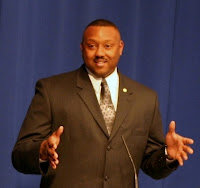 Many people think about going into the speaking industry thinking they're going to just cake out and make mega-bucks. They think they'll be the next Les Brown or Tony Robbins because they have memorized a couple of positive affirmations. Sorry ... It just doesn't work that way. Like anything else worthwhile in life, you're going to have to start at the bottom and work your way up.
Many people think about going into the speaking industry thinking they're going to just cake out and make mega-bucks. They think they'll be the next Les Brown or Tony Robbins because they have memorized a couple of positive affirmations. Sorry ... It just doesn't work that way. Like anything else worthwhile in life, you're going to have to start at the bottom and work your way up.
Having said that, allow me to introduce you to the "1st Commandment" of Professional Speaking ...
"Thou must go from FREE to FEE!" Seriously,
it was John C. Maxwell who said, "People don't care how much you know
until they know how much you care." The best way a total
stranger can show you that they care about what you know is paying you their
hard earned money for you to share what you know. However, the only way they're
going to do that is if they know it's going to be worth it.
 Starting
out, you're going to need to build an audience and a following. If you have a
great message to deliver, and people are getting it for free at churches,
schools, and Toastmasters events (to name a few), they're going to talk about
you and word will spread. Coincidentally, IF YOU SUCK they're going to talk
about you and word will spread, so DON'T SUCK!
Starting
out, you're going to need to build an audience and a following. If you have a
great message to deliver, and people are getting it for free at churches,
schools, and Toastmasters events (to name a few), they're going to talk about
you and word will spread. Coincidentally, IF YOU SUCK they're going to talk
about you and word will spread, so DON'T SUCK!
When you do
get these "free" gigs, make sure you have some way of getting
people's contact information. Have a sheet that people can put their names,
phone numbers and e-mail addresses on. If you're on Facebook, create a fan-page and direct people to
it. This way, when you have new gigs coming up you can spread the word and
there is how you get your "following," because those who were really
moved by your message will do just that, follow you.
 |
| The first money I ever made as a speaker! $150 cash for a 20 minute speech. |
Now when do,
or should you begin charging people? That's hard to say because that's a
decision you will have to make for yourself. But when you feel the time is right, here are a few tips:
(1) ALWAYS
make it known that you're a "professional" speaker (even when you're speaking for
free). You never know when someone will see you, who will pay you straight from
the gate. Always be ready to get paid! I got paid for my first speech, and specifically told the people I wasn't charging them!
(2) People respect what they see. Carry yourself as a professional and people will treat you as a professional. Those who don't aren't worth doing business with anyway, so don't give them a second thought.
(3) Create a
Speakers Agreement (contract) for yourself. It outlines what you require as
well as what services you will provide.
(4) In that
Agreement, add a "Confidentiality Clause" that prohibits both you and your client from divulging how much you're charging and they're paying for your services. What you charge and what
you actually make may be different from one client to another and for any variety of reasons. You
may negotiate a lower honorarium for a particular group that has a lower
budget, but you still wish to speak for them, or you may donate a portion or all
of your honorarium back to the organization. You want to protect yourself as
much as possible and not create friction should people talk about you when
"comparison shopping" for speakers. Everyone is looking for a break (or a "hook-up"), and when people feel they are catching one, they're not likely to share that information if doing so means they might not catch a similar break in the future.
There is nothing more gratifying than to receive a nice check for what seems to be a few minutes of speaking, but keep in mind that you're not just getting paid for the minutes you spend on stage behind the microphone. You're getting paid for the time you spend researching, writing and rehearsing your presentation. Look at it like this ... You may only see professional athletes during game time on the weekends, but during the week, they're training and practicing and spending countless hours watching videos of previous games and matches.
Professional speaking is an industry that requires you to pay some dues in order to rise up. You can make a good living for yourselves, but you've got to make your bones. You're going to have to hone your skills and be true to your craft. The time you invest in the beginning of your career as a professional speaker will pay off massive dividends down the line, but you're going to have to create a foundation for yourselves. The stronger and deeper your foundation, the higher you can go in your career.
No comments:
Post a Comment